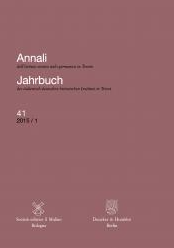Annali dell'Istituto storico italo-germanico in Trento | Jahrbuch des italienisch-deutschen historischen Instituts in Trient, 41, 2015/1

Editore: il Mulino - Duncker&Humblot
Città: Bologna - Berlin
Anno: 2015
Pagine: 154
Cartaceo
Indice
Editoriale | pp. 5
Saggi
- Heinrich Lang, Credito e insolvenza sovrana. I prestiti alla Corona francese di mercanti-banchieri toscani e tedeschi meridionali (1500-1559)
pp. 11-38 - Fabian Klose, Il Congresso di Vienna e le origini dell’intervento umanitario
pp. 39-70 - Friedrich Kießling, Gli intellettuali e gli esordi dei due stati tedeschi. Storie separate e visioni d’insieme
pp. 71-102
Recensioni
- V. Sebastiani, Christoph Galle, Hodie nullus – cras maximus. Berühmtwerden und Berühmtsein im frühen 16. Jahrhundert am Beispiel des Erasmus von Rotterdam
pp. 105-107 - M. Rospocher, Joy Wiltenburg, Crime and Culture in Early Modern Germany
pp. 107-109 - K. Occhi, Oscar Gelderblom, Cities of Commerce. The Institutional Foundations of International Trade in the Low Countries, 1250-1650
pp. 110-112 - F. Alfieri, Rob Boddice (ed), Pain and Emotion in Modern History
pp. 112-115 - L. Pozzi, Monika Wienfort, Verliebt, verlobt, verheiratet: Eine Geschichte der Ehe seit der Romantik
pp. 115-117 - E. Jousse, Leslie Brückner, Adolphe-François Loève-Veimars (1799-1854). Der Übersetzer und Diplomat als interkulturelle Mittlerfigur
pp. 117-121 - M. Bellabarba, Hermann J.W. Kuprian - Oswald Überegger (edd), Katastrophenjahre: Der Erste Weltkrieg und Tirol
pp. 121-124 - M. Mondini, Jörn Leonhard, Die Büchse der Pandora. Geschichte des Ersten Weltkriegs; Gerd Krumeich, Juli 1914. Eine Bilanz
pp. 125-127 - P. Pombeni, Dirk Kaesler, Max Weber. Preuße, Denker, Muttersohn. Eine Biographie
pp.127-132 - M. Cau, Thomas Duve (ed), Entanglements in Legal History: Conceptual Approaches
pp. 132-135 - G. D’Ottavio, Frieder Günther (ed), Theodor Heuss. Privatier und Elder Statesman. Briefe 1959-1963
pp. 135-138 - G. Bernardini, Martin Kohlrausch - Helmuth Trischler, Building Europe on Expertise. Innovators, Organizers, Networkers
pp. 138-141 - E. Pfanzelter, Arnold Suppan, Hitler – Beneš – Tito. Konfl ikt, Krieg und Völkermord in Ostmittel- und Südosteuropa
pp. 142-145
Bollettino
- Attività convegnistica | pp. 149
- Attività editoriale | pp. 152
- Biblioteca | pp. 154
- Autori | pp. 155
Abstract
Heinrich Lang - Credito e insolvenza sovrana. I prestiti alla Corona francese di mercanti-banchieri toscani e tedeschi meridionali (1500-1559)
The French kings Francis and Henry II required extraordinary financial means for their wars against Emperor Charles V. Mainly Tuscan and South German merchant bankers offered composite loans, which they raised from credit networks. On the one hand the development of the royal fiscal administration is well documented, on the other scholars have focused less on the strategies the merchant bankers employed for the making of markets for credit. The Florentine business partnership agglomerate of the Salviati and the company of the Welser from Augsburg set up a syndicate for the lease agreement of the gabelle (the toll paid on silk imported to the kingdom of France) along the Rhône from 1521-1528 when they gave 126.000 livres to King Francis. The account books of the Salviati Archives show that the share the Salviati held was financed by a group of investors. The Salviati-company was able to raise fair deposits for the investment in credits to the Crown when they contributed more than 250.000 livres to Henry II in 1553. In 1555 the royal government imposed the Grand Parti, a mechanism for regulating the taking and repaying of loans. Although similar multilayered networks of credit backed up the loans, which soon reached a sum of 4.5 million livres, the mechanism ran insolvent in 1559.
Fabian Klose - Il Congresso di Vienna e le origini dell’intervento umanitario
When evaluating the Congress of Vienna of 1814/15, historians traditionally concentrate on the establishment of a new international order in the wake of the Napoleonic Wars. In this context, the practice of intervention was attributed a clear function: the Great Powers would jointly intervene to put down revolutions that posed a danger for the newly created order. However, to interpret the practice of intervention as having derived strictly from antirevolutionary concerns is to overlook another aspect taking shape in the shadows of the congress, one that would become firmly established in nineteenth-century international politics, namely, the use of military intervention to enforce an internationally stipulated humanitarian norm. The essay argues that the international ban of the slave trade, as declared by the Congress of Vienna, not only created an international humanitarian norm but also conceived the corresponding international apparatus to enforce it. This perspective throws a new light on the early nineteenth-century practice of intervention. Thus, this article traces the origins of the practice of humanitarian intervention to the milieu of the Congress of Vienna and the context of the fight against the transatlantic slave trade.
Friedrich Kießling - Gli intellettuali e gli esordi dei due stati tedeschi. Storie separate e visioni d’insieme
Bringing together East and West Germany’s past is one of the most intriguing tasks of contemporary German historiography. This is especially true for the intellectual development in East and West. Nevertheless, there are many difficulties facing one common German history, which covers both parts of the once divided country alike. While West German intellectual history could easily be interpreted in terms of an increasing liberalization, the issue of governmental repression is far more important for studies of East German intellectual life. The structure of the public sphere also shows vast dissimilarities. Finally, the question arises, whether intellectual history should be narrated as a «national» history at all or if it would not be better to focus on a broader international context from the onset. Considering such complexities, this essay advocates a pragmatic approach to a mutual German intellectual history after 1945, which accepts dissimilarities and possible shortcomings of a common perspective and at the same time is open to the shared dimensions of intellectual history in East and West Germany.

